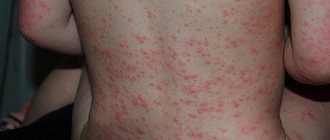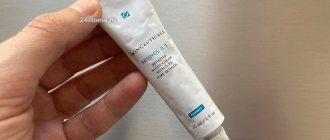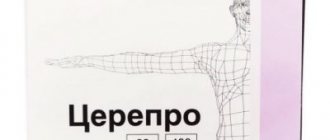Cogitum 250 mg 10 ml 30 pcs. oral solution patheon france
pharmachologic effect
General tonic.
Composition and release form Cogitum 250 mg 10 ml 30 pcs. oral solution patheon france
Solution - 10 ml:
- active substance: potassium acetylaminosuccinate - 250 mg;
- excipients: fructose 1000 mg, methyl parahydroxybenzoate 15 mg, banana flavor 7 mg, purified water up to 10 ml.
10 ml of the drug in a dark glass ampoule (type III), sealed on both sides, with a break line and a marking ring on each side. 10 ampoules in a cardboard packaging insert. 3 cardboard packaging inserts along with instructions for use per cardboard box.
Description of the dosage form
Transparent light yellow solution with the smell of banana.
Directions for use and doses
The drug is intended for oral administration. The dose is prescribed individually by the doctor. The average dose for adults is 3 ampoules per day: 2 in the morning and 1 at night. The maximum dose is not known.
For children aged 7 to 10 years, it is recommended to take 1 ampoule orally in the morning; for children aged 10 to 18 years, it is recommended to take 2 ampoules orally in the morning.
To take it, you need to open the ampoule on one side, then, placing a glass or cup under the opened end, break off the opposite end of the ampoule. After this, the liquid will flow freely into the substituted container. The taste of the drug allows it to be used without prior dilution. If it is diluted with water, the banana flavor may be lost. The most preferable is to take the drug in the morning.
The average duration of treatment in children and adults is 3 weeks.
If for any reason one or more doses of the drug were missed, treatment can be continued without the need for a secondary dose adjustment.
Treatment can also be stopped suddenly without any serious consequences for the patient.
Pharmacodynamics
The active principle of the drug is acetylaminosuccinic acid, a biologically active compound contained in the central nervous system of the central nervous system. The drug helps normalize nervous regulation processes and has a stimulating effect.
Indications for use Cogitum 250 mg 10 ml 30 pcs. oral solution patheon france
As part of complex therapy of asthenic syndrome.
Contraindications
Hypersensitivity reactions to acetylaminosuccinic acid or any of the components of the drug.
Children under 7 years of age (no clinical data).
Pregnancy (insufficient clinical data).
Application of Cogitum 250 mg 10 ml 30 pcs. patheon france oral solution during pregnancy and lactation
Pregnancy
Use during pregnancy is contraindicated (due to insufficient data).
Women during breastfeeding
During treatment with the drug, breastfeeding should be stopped.
special instructions
Impact on the ability to drive vehicles and operate machinery
It is unlikely that the drug will affect the ability to drive vehicles, operate machinery, or engage in other potentially hazardous activities.
Overdose
To date, no cases of overdose of the drug Cogitum have been reported. No toxic effects are expected.
Side effects Cogitum 250 mg 10 ml 30 pcs. oral solution patheon france
Allergic reactions are possible.
Drug interactions
No interactions with other drugs were noted.
A drug based on acetylaminosuccinic acid: experience and prospects for use
The use of pharmacological drugs based on amino acids is a generally accepted practice, used over the past decades not only by neurologists and therapists, but also by doctors of other specialties [1–5].
It is known that amino acids provide energy to the body’s muscle tissues and act as neurotransmitters (or are their precursors) [6]. They contribute to the adequate implementation of the functions of macro-, microelements and vitamins. It is for this reason that drugs based on both essential (essential) and non-essential amino acids are traditionally used in various areas of clinical medicine [4, 7].
If the body does not receive nonessential amino acids, essential amino acids are consumed. Modern data indicate that the biosynthesis of non-essential acids (including aspartic acid) in quantities that fully meet the body’s needs is impossible [7, 8].
It is believed that it is advisable to take amino acids together with cofactors involved in a cascade of complex metabolic processes [7].
In this regard, it is advisable to consider the features of using the drug Cogitum. The active ingredient of the drug is acetylaminosuccinic acid [9], which is a synthetic analogue of aspartic acid, corresponding to its mechanisms of biological action in the body [8].
Aspartic acid
Aspartic acid is synthesized in the body from asparagine. It is part of animal and plant proteins, belongs to non-essential (nonessential) amino acids and is an endogenous biospecific compound contained in the central nervous system (CNS), especially in the brain [6–11].
The name aspartic acid comes from the Greek word asparagoe - asparagus, since asparagine was first discovered in asparagus shoots.
The mechanisms of action are characterized by a multivariable focus. Aspartic acid has:
- immunomodulatory effect (accelerates the process of formation of immunoglobulins and antibodies);
- participates in the synthesis of deoxyribonucleic and ribonucleic acids - the main carriers of genetic information;
- increases physical endurance;
- normalizes the balance of excitation and inhibition in the central nervous system (CNS), etc. [6, 9, 10].
Aspartic acid plays a critical role in various metabolic reactions [7, 11]. It promotes the transformation of carbohydrates into glucose with the subsequent creation of glycogen reserves, resulting in increased resistance to fatigue.
Together with glutamic acid and glycine, aspartic acid serves as a neurotransmitter in the central nervous system. It stabilizes the processes of nervous regulation and has psychostimulating activity [6].
Aspartic acid has a number of protective properties:
- proven hepatoprotective effect (against some toxic substances);
- protective effect against exposure to radiation;
- an effect that promotes the elimination of neurotoxic ammonia from the body, i.e. it has a neuroprotective effect [6, 10, 11].
The drug Cogitum is not a dietary supplement (dietary supplement) or a food additive, an “orthomolecular” complex, but is classified as a prescription drug. The drug Cogitum was first described in the second half of the 1960s. French researchers A. Soulairac (1966) and others, as well as C. Bouvier and A. Masqion (1969) [12–15]. Thus, the world experience in using Cogitum is over 40 years. The drug has been listed in the PubMed database (a medical portal representing the electronic archive of the National Center for Biotechnology Information at the US National Library of Medicine) since 1966 [12].
In Russia, it found relatively widespread use in the 1990s. According to PrIndex “Monitoring of drug prescriptions” (Moscow, November 2006), currently up to 48% of prescriptions for the drug Cogitum are made by neurologists, 35% by therapists, the remaining 17% by doctors of other specialties (pediatricians, psychiatrists, ophthalmologists, ENT specialists). doctors, etc.). Cogitum is actively used in various fields of medicine: pediatrics, therapy, neurology, psychiatry, rehabilitation, etc.
In the International Classification of Diseases, 10th revision (ICD-10), there are two main categories for the use of the drug Cogitum: R53 - Malaise and fatigue, and F32.0 - Mild depressive episode [9].
In pediatric practice, the drug has been actively used for many years in the following clinical situations: delayed motor, psychomotor, speech, emotional and pre-speech development, various syndromes of perinatal damage to the nervous system and their outcomes, neurological deficit due to various forms of cerebral palsy, hydrocephalus (congenital and acquired), etc. [16–21].
According to the analysis carried out by MEDI-Q "Opinion of Practitioners", over a 12-month period (November 2004 - November 2005), the number of Cogitum prescriptions in the Russian Federation increased by 1.5 times. It is most actively prescribed to patients (children and adults) in Russian cities such as Moscow, Samara, Voronezh, Irkutsk and Novosibirsk.
The drug Cogitum is an oral solution, produced in dark glass ampoules (10 ml capacity) in packs of 30 ampoules. The solution is clear, pale yellow, with the smell and taste of banana.
1 ml of the drug contains 25 mg of acetylaminosuccinic (aspartic) acid, 1 ampoule - 10 ml, 250 mg.
In the Vidal Directory (ed. 2, 1996), aspartic acid was indicated as the active ingredient of the drug (as a substance more familiar to medical workers); only later, instead of aspartic acid, acetylaminosuccinic acid began to be used as the base ingredient of Cogitum [22–24].
Cogitum belongs to the pharmacological group of general tonics and adaptogens. Being a general tonic drug, an adaptogen, it also helps to stabilize nervous regulation processes. Cogitum refers to drugs that influence cerebral metabolism, helping to improve metabolic processes in brain tissue. The drug has a psychostimulating and mild antidepressant effect; in terms of its active substance - an analogue of aspartic acid - it is a representative of amino acid preparations with a proven nootropic effect [25].
I. S. Zozulya et al. (2005), when classifying neuroprotectors, nootropics and neurometabolites, Cogitum is classified in conditional subgroup 9d “Drugs with a combined mechanism of action (correction of energy metabolism)” in group 9 “Antioxidants” [25]. It is indicated that the search for drugs with antioxidant properties has led to the synthesis of drugs with combined mechanisms of action (antioxidant, antihypoxic, membrane stabilizing, nootropic). Such medications are directly related to energy metabolism correctors (so-called “metabotropic” drugs).
Indications for the use of the drug Cogitum in accordance with the manufacturers' annotation recommendations are:
- functional asthenic states, increased fatigue with or without decreased mood;
- neurosis with mild depression.
The drug is taken during treatment with antidepressants as an adjuvant [9].
The need to prescribe Cogitum may also arise in the following situations:
- generalized and partial impairments of cognitive (cognitive) functions;
- disturbances in emotional balance;
- intense physical and intellectual stress (training, etc.), psycho-emotional stress;
- chronic fatigue syndrome;
- neurotic reactions, etc.
The experience of using the drug Cogitum, accumulated to date in the Russian Federation, allows us to identify a whole range of conditions as a “candidate” pathology subject to therapy using the specified drug (ICD-10 headings):
- G80 - Cerebral palsy;
- G91 - Hydrocephalus;
- G93.3 - Fatigue syndrome after a viral illness;
- G93.4 - Encephalopathy, unspecified;
- T90.5 - Consequences of intracranial injury;
- R62.0 - Delayed developmental stages;
- F43 - Reaction to severe stress and adjustment disorders (F43.0 - Acute reaction to stress, F43.1 - Post-traumatic stress disorder, F43.2 - Adjustment disorder, F43.20 - Short-term depressive reaction due to adjustment disorder, F43.21 — Prolonged depressive reaction caused by adaptation disorder, F43.23 — Mixed anxious and depressive reaction caused by adaptation disorder, F43.23 — Adaptation disorder with a predominance of disturbances of other emotions, F43.24 — Adaptation disorder with a predominance of behavioral disorders, F43.25 — Mixed disorder of emotions and behavior due to adjustment disorder, F43.28 - Other specific predominant symptoms due to adjustment disorder, F43.8 - Other reactions to severe stress);
- F48 - Other neurotic disorders (F48.0 - Neurasthenia, F48.8 - Other specified neurotic disorders, F48.9 - Unspecified neurotic disorder);
- F79 - Mental retardation, unspecified;
- F80 - Specific developmental disorders of speech and language (F80.0 - Specific speech articulation disorder, F80.1 - Expressive language disorder, F80.2 - Receptive language disorder);
- F81 - Specific developmental disorders of learning skills (F81.0 - Specific disorder of reading, F81.1 - Specific disorder of spelling, F81.2 - Specific disorder of arithmetic skills, F81.3 - Mixed disorder of learning skills, F81.8 - Other developmental disorders of school skills skills, F81.9 - Developmental disorder of learning skills, unspecified);
- F82 - Specific developmental disorders of motor function;
- F83 - Mixed specific disorders of psychological (mental) development;
- F84 - General disorders of psychological (mental) development (F84.8 - Other general developmental disorders, F84.9 - General developmental disorder, unspecified), etc. [26–28].
Cogitum is also used in the treatment of the consequences of neuroinfections and traumatic brain injuries, general speech underdevelopment, intellectual disability, mental retardation of varying severity, chronic fatigue syndrome, etc.
It is extremely important to emphasize that Cogitum can be used not only for the nosological forms described above, but also for healthy individuals of any age exposed to physical, emotional and mental stress during periods of intensive study, physical labor, training, etc. Thus, one One of the important indications for the use of the drug Cogitum is the stimulation of mental activity in children and adults in the absence of persistent somatic pathology and severe neurological deficit.
The spectrum of action of the drug Cogitum and the indications for its use exceed those of most known nootropic and neurometabolic agents available in Russia.
There are no strict age-related contraindications to the use of Cogitum. It can be taken by children and the elderly. Taking the drug during pregnancy and breastfeeding is also not contraindicated. No cases of negative effects have been reported [9, 22–24].
The only true contraindication to the use of the drug is hypersensitivity to acetylaminosuccinic acid and other ingredients of the drug (allergic reactions and individual intolerance).
The instructions for medical use of the drug Cogitum from 2006 indicate that “there are no clinical data” on its use in children under 7 years of age [9]. At the same time, in the Russian Federation, doctors have significant positive experience in using Cogitum in children of younger ages, including the first year of life. In this regard, when prescribing the drug to children under 7 years of age, it is advisable to obtain informed written consent from the patients’ parents.
Side effects are rare. Cases of overdose of the drug Cogitum and associated adverse events have not been reported in the available literature [9, 29].
Cogitum does not cause convulsive activity.
Hypersensitivity reactions to the components of the drug are possible - allergic reactions.
The drug is administered orally undiluted or with a small amount of liquid. The taste qualities of Cogitum allow it to be used without prior dilution. If it is diluted with water, the banana taste may be lost [9].
Taking the drug in the morning is considered the most preferable. If necessary, the dosage of the drug is carried out individually.
For adults, the average daily dose of Cogitum is 750 mg (i.e., the contents of three ampoules). The drug is prescribed orally (per os), the frequency of administration is 2 times a day. A dose of 500 mg (2 ampoules) is taken in the morning and 250 mg (1 ampoule) at night. The maximum daily dose has not been determined. The average recommended duration of treatment is 3 weeks.
It is possible to change the dosage regimen and frequency of taking the drug in accordance with the recommendations of the attending physician. If for any reason one or more doses of the drug were missed, treatment can be continued without the need to adjust the prescription. Sudden discontinuation of the drug does not entail serious consequences for the patient [9].
For children aged 7 to 10 years, it is recommended to take 1 ampoule (250 mg) orally in the morning. Children over 10 years of age should take the contents of 2 ampoules (500 mg) in the morning [9]. For patients who have reached adolescence, dosing of the drug can be carried out (according to indications) as in adults. The existing experience in using a drinking solution of acetylaminosuccinic (aspartic) acid allows us to recommend for pediatric patients the duration of the treatment course from 2 weeks to 1 month.
For infants (< 12 months), the dose of the drug is usually 125 mg (5 ml = 1/2 ampoule) 2 times a day (daily dose - 250 mg), and for patients older than 1 year (1-7 years) the dose is individual determined by the doctor. If necessary, the daily dose can be increased to 500 mg (20 ml = 2 ampoules), divided into 2 doses during the day.
Thus, Cogitum is the only drug based on acetylaminosuccinic acid for which there are no described adverse drug interactions. It is a product of chemical synthesis and does not contain potentially dangerous biological components of animal origin. Cogitum has good organoleptic properties; it does not contain crystalline sugar (sucrose) or synthetic substitutes (sweeteners), which allows the drug to be used by patients with diabetes.
The drug Cogitum has long been successfully used in our country in various clinical situations and in children under the age of 7 years.
Cogitum is not only a general tonic and adaptogen, but at the same time has a proven nootropic and neuroregulatory action, anti-stress effect and neurometabolic activity.
Literature
- Graber M. A., Lanterner M. L. Guide to family medicine. Per. from English M.: Binom-Press, 2002. 752 p.
- Child neurology (Menkes JH, Sarnat HB, Maria BL, eds.). 7th ed. Lippincott Williams & Wilkins. Philadelphia-Baltimore, 2006. 1286 p.
- Nelson textbook of pediatrics (Behrman RE, Kliegman RM, Jenson HB, eds.). 17th ed. Philadelphia-London. WB Saunders, 2004. 2618 p.
- Diagnosis and treatment of diseases of the nervous system in children / ed. V. P. Zykova. M.: Triada-X, 2006. 256 p.
- Washington University Therapeutic Handbook. 2nd Russian ed. / ed. C. Carey, H. Lee, C. Weltje. Per. from English Practice. Lippincott, 2000. 879 p.
- Biochemistry of the brain / ed. I. P. Oshmarina, P. V. Stukalova, N. D. Eshchenko. St. Petersburg: St. Petersburg University. 1999. 325 p.
- General nutritional science: Textbook / Martinchik A. N., Maev I. V., Yanushevich O. O. M.: MEDpress-inform, 2005. 392 p.
- Marshall V.D. Clinical biochemistry / Transl. from English M.–SPb.: BINOM Publishing House. Nevsky Dialect. 2000. 367 p.
- Instructions for medical use of the drug Cogitum // Reg. No. 011377/01 dated April 14, 2006
- Rozman M. Aspartic acid side chain effect: experimental and theoretical insight // J. Am. Soc. Mass. Spectrom. 2007; 18: 121–127.
- Trevino SR, Scholtz JM, Pace CN Amino acid contribution to protein solubility: Asp, Glu, and Ser contribute more favorably than the other hydrophilic amino acids in RNase Sa // J. Mol. Biol. 2007; 366:449–460.
- Soulairac A. Examination of posture regulation by statokinesiometry. Its application to the study of vigilance levels in the normal subject before and after treatment with PC 63–14 // Cah. Coll. Med. Hop. Paris. 1966; 7:669–672.
- Lambert M. Alcoholic disintoxication therapy and psychiatry. The place of PC 63–14 (Cogitum) // J. Med. Lyon. 1967; 48:691–695.
- Guyotat J., Jallade S., Marie-Cardine M. Clinical trial in hospital setting of PC-6314 (Cogitum). 30 cases // J. Med. Lyon. 1968; 49:1447–1457.
- Bouvier C., Masqion A. Therapeutic effects of PC 63–14 in psychiatric practice // Lyon. Med. 1969; 221:1561–1564.
- Barashnev Yu. I. Perinatal neurology. M.: Triada-X, 2001. 640 p.
- Kirdyashkina M.A. Efficiency of correction of cognitive impairment in children with minimal cerebral dysfunction // Author's abstract. dis. ...cand. honey. Sci. M., 2001. 22 p.
- Classification of perinatal lesions of the nervous system in newborns: Method. rec. M.: VUNMC Ministry of Health of the Russian Federation. 2000. 40 p.
- Industry standards for the volume of medical care for children. M.: Dzhangar, 2001. 608 p.
- Studenikin V. M. Approaches to the correction of delayed psychomotor and speech development in children // Doctor. RU. 2005. No. 1. P. 6–8.
- Khachatryan L.G. Early and late manifestations of perinatal damage to the nervous system in young children // Abstract of thesis. dis. ...Dr. med. Sci. M., 2003. 50 p.
- Vidal reference book: Medicines in Russia. Directory. 2nd edition. M.: AstraPharmServis, 1996. B-318.
- Vidal reference book: Medicines in Russia. Directory. 6th edition, revised, corrected. and additional M.: OVPEE/ZAO AstraPharmServis. 2000. B-243.
- Register of Medicines of Russia "Encyclopedia of Medicines". 7th edition, revised. and additional M.: "RLS-2000", 2000. P. 450.
- Zozulya I. S., Martynyuk V. Yu., Maystruk O. A. Neuroprotectors, nootropics, neurometabolites in intensive care of lesions of the nervous system. Kyiv. Intermed, 2005. 132 p.
- Mental disorders and behavioral disorders (F00-F99) (Class V ICD-10, adapted for use in the Russian Federation) / ed. B. A. Kazakovtseva, V. B. Gollanda. M.: Ministry of Health of Russia. 1998. 512 p.
- Handbook-guide for a practicing physician “2000 diseases from A to Z” / ed. I. N. Denisova, Yu. L. Shevchenko. 2nd edition. M.: GEOTAR-MED, 2003. 1344 p.
- Neurodevelopmental disorders: cognitive/behavioural phenotypes (Riva D., Bellugi U., Denckla MB, eds.). Vol. 13. Montrouge (France). John Libbey Eurotext. 2005; 152 p.
- Zmushko E.I., Belozerov E.S. Drug complications. SPb.: Publishing house "PITER", 2001. 426 p.
V. M. Studenikin, Doctor of Medical Sciences, Professor S. V. Balkanskaya V. I. Shelkovsky SCCD RAMS, Moscow
Cogitum solution for internal use 25 mg/ml amp 10 ml N 30
Active substance
international nonproprietary name not assigned (non appropriated)
ATX code
N06BX (Other psychostimulants and nootropics)
Release form, packaging and composition of the drug
◊ Oral solution
light yellow in color, transparent, with the smell of banana.
| 1 ml | 1 amp. | |
| potassium acetylaminosuccinate | 25 mg | 250 mg |
[PRING] fructose - 1000 mg, methyl parahydroxybenzoate - 15 mg, banana flavor - 7 mg, purified water - up to 10 ml.
10 ml - dark glass ampoules (10) - cardboard packaging inserts (3) - cardboard packs.
Clinical and pharmacological group
General tonic drug
Pharmacotherapeutic group
General tonic
pharmachologic effect
Data on the pharmacokinetics of the drug Cogitum are not provided.
Indications for use
- as part of complex therapy of asthenic syndrome.
Dosage
The drug is intended for oral administration. The dose is prescribed individually by the doctor.
For adults
the average dose is 3 ampoules/day: 2 in the morning and 1 at night. The maximum dose is not known.
Children aged 7 to 10 years
It is recommended to take 1 ampoule in the morning;
children aged 10 to 18 years
are recommended to take 2 ampoules in the morning.
The average duration of treatment in children and adults is 3 weeks.
If for any reason one or more doses of the drug were missed, treatment can be continued without the need for a secondary dose adjustment.
Treatment can also be stopped suddenly without any serious consequences for the patient.
To take it, you need to open the ampoule on one side, then, placing a glass or cup under the opened end, break off the opposite end of the ampoule. After this, the liquid will flow freely into the substituted container. The taste of the drug allows it to be used without prior dilution. If it is diluted with water, the banana flavor may be lost. The most preferable is to take the drug in the morning.
Contraindications
- children under 7 years of age (no clinical data);
- pregnancy (insufficient clinical data);
- hypersensitivity to acetylaminosuccinic acid or any other component of the drug.
Overdose
Currently, no cases of overdose of the drug Cogitum have been reported. No toxic effects are expected.
Side effects
are possible
.
Overdose
No interaction of the drug Cogitum with other drugs has been observed.
Storage conditions
The drug should be stored out of the reach of children, protected from light, at a temperature not exceeding 25°C. Best before date —
3 years.
Conditions for dispensing from pharmacies
The drug is approved for use as a means of OTC.
Special Instructions
The drug can be used in elderly patients.
Impact on the ability to drive vehicles and operate machinery
No data. It is unlikely that the drug can affect the ability to drive vehicles, operate machinery, or engage in other potentially hazardous activities.




